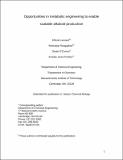Opportunities in metabolic engineering to facilitate scalable alkaloid production
Author(s)
Leonard, Effendi; Runguphan, Weerawat; O'Connor, Sarah Ellen; Prather, Kristala L. Jones
DownloadPrather-Opportunities in metabolic engineering.pdf (199.5Kb)
OPEN_ACCESS_POLICY
Open Access Policy
Creative Commons Attribution-Noncommercial-Share Alike
Terms of use
Metadata
Show full item recordAbstract
Numerous drugs and drug precursors in the current pharmacopoeia originate from plant sources. The limited yield of some bioactive compounds in plant tissues, however, presents a significant challenge for large-scale drug development. Metabolic engineering has facilitated the development of plant cell and tissue systems as alternative production platforms that can be scaled up in a controlled environment. Nevertheless, effective metabolic engineering approaches and the predictability of genetic transformations are often obscured due to the myriad cellular complexities. Progress in systems biology has aided the understanding of genome-wide interconnectivities in plant-based systems. In parallel, the bottom-up assembly of plant biosynthetic pathways in microorganisms demonstrated the possibilities of a new means of production. In this Perspective, we discuss the opportunities and challenges of implementing metabolic engineering in various platforms for the synthesis of natural and unnatural plant alkaloids.
Date issued
2009-04Department
Massachusetts Institute of Technology. Department of Chemical Engineering; Massachusetts Institute of Technology. Department of ChemistryJournal
Nature Chemical Biology
Publisher
Nature Publishing Group
Citation
Leonard, Effendi et al. “Opportunities in metabolic engineering to facilitate scalable alkaloid production.” Nature Chemical Biology 5.5 (2009): 292-300.
Version: Author's final manuscript
ISSN
1552-4450
1552-4469